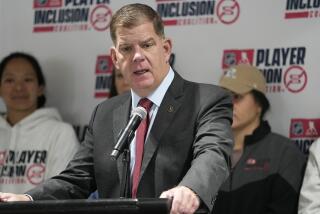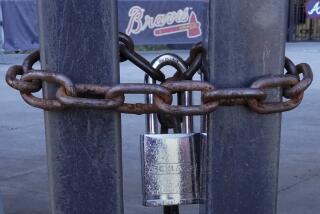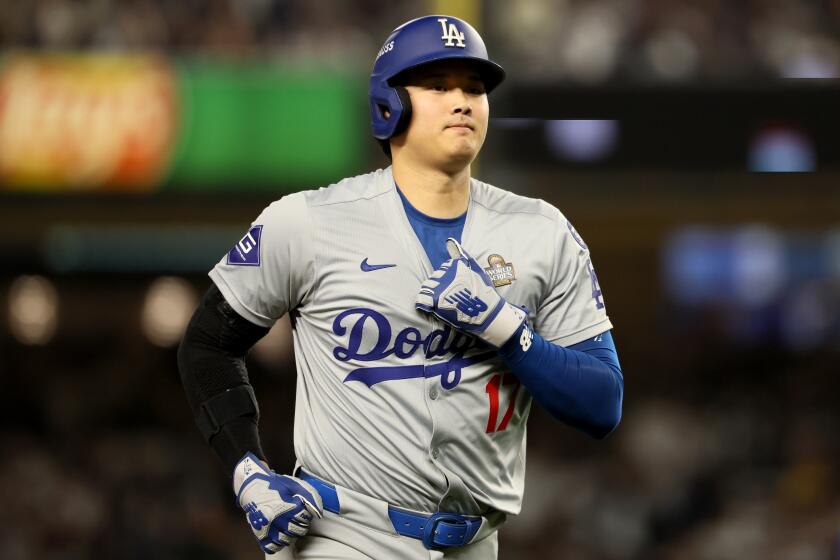Some questions and answers as the NHL lockout continues
Representatives of the NHL and the players’ union met twice in Toronto on Monday, once to review last season’s revenue figures and again at an NHL Alumni dinner, but they appeared no closer to resolving the labor dispute that led the league to lock out players Sept. 15.
Deputy Commissioner Bill Daly told reporters the NHL is “100% focused on not missing any regular-season games, and hopefully we can achieve that objective.” However, time is running out before the Oct. 11 season opener. The league has canceled exhibition games through Sunday and could cancel more this week.
No full-scale talks have taken place since Sept. 12. Daly said he is hopeful negotiations will resume but added, “I think it’s fair to say we feel like we need to hear from the players’ association in a more meaningful way because I don’t think they’ve really moved off their initial proposal, which was made more than a month ago.”
Here are some questions about the lockout and its potential impact:
What is this about?
How to divide billions of dollars and, in essence, save owners from their excesses while also propping up small-market teams. Revenue reached a league-record $3.3 billion last season, but player salaries consumed 57%. Owners want that percentage to shrink.
Where do they stand?
Days before the lockout, the NHL proposed a six-year deal in which player salaries would equal 49% of hockey-related revenue in the first year, 48% in the second year and 47% in each of the remaining four years. That represents an immediate cut players vow they won’t accept. The NHLPA’s last proposal started with the $1.87 billion players earned last season as a base for a 2% increase in the first year, to 54.3% of revenue. They’d go to 52.5% and 52% in the next two years, assuming hockey-related revenue continue to grow at a 7.1% rate. In the fourth and fifth years, players would get $2.1 billion plus 54% of the growth in revenue in those years. The NHL doesn’t think that’s enough of a drop.
Will the entire 2012-13 season be wiped out?
It shouldn’t. The disagreement that fueled the 2004-05 lockout was over adopting a completely new economic system built on a salary cap. This isn’t about philosophical changes — it’s about the league wanting to pay out a smaller percentage of revenue to players because the NBA and NFL got similar agreements. There is a deal here for reasonable people to make. The key word is “reasonable.”
Which players would be hurt most?
Veterans such as New Jersey Devils goaltender Martin Brodeur and Ducks winger Teemu Selanne might be robbed of a farewell season. Elite young forwards such as Tampa Bay’s Steven Stamkos, Pittsburgh’s Sidney Crosby and the New York Islanders’ John Tavares could lose prime seasons that would have boosted them on the career scoring lists.
What are players doing?
Many have signed with European or Russian teams for the duration. Some will play on a charity tour in Quebec. Those who are working out must rent ice time and can’t use team locker rooms or workout facilities. The only players who will be paid are those with pre-existing hockey-related injuries and those whose contracts included signing bonuses due before Sept. 15. Everyone will get back almost all the 8.5% of their salaries they paid into escrow last season.
Will this hurt the Kings?
It would halt media momentum they built during their Cup run last spring, a tough blow for a team that has always fought for recognition in a busy sports market. But a delayed start would give goaltender Jonathan Quick (back surgery) and winger Dustin Penner (wrist surgery) more time to heal. “They would have been borderline ready for training camp. Jonathan for sure wouldn’t have been. Dustin would have been close,” Coach Darryl Sutter said. The Kings were to have begun exhibition play Monday.
Will the Kings keep the Cup if the season is canceled?
Alas, they don’t. It will be returned to the Hockey Hall of Fame after appearing at some promotional events.
What will be inscribed on the Cup if the season is canceled?
Probably what was inscribed after the canceled 2004-05 season: “Season Not Played.”
What’s a good guess for when the season will start?
A December settlement with the season opening with the Winter Classic on New Year’s Day. But after the 1994-95 lockout, the NHL salvaged a 48-game season by starting in mid-January and playing deep into June, so a later start is possible.
More to Read
Go beyond the scoreboard
Get the latest on L.A.'s teams in the daily Sports Report newsletter.
You may occasionally receive promotional content from the Los Angeles Times.











